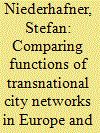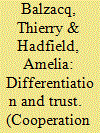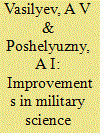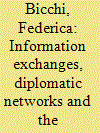|
|
|
Sort Order |
|
|
|
Items / Page
|
|
|
|
|
|
|
| Srl | Item |
| 1 |
ID:
124091


|
|
|
|
|
| Publication |
2013.
|
| Summary/Abstract |
Transnational city networks (TCNs) are organisations that facilitate information exchange, cooperation and lobbying activities of cities from different countries-independent of the national level. This paper compares the aims and goals of European and Asian city networks, asking if there are significant differences between the two regions or if certain global patterns of urban international relations can be identified. The analytical concept draws on the literature on European TCNs and identifies specific functions they provide to their membership. By way of a comparative analysis, this concept is extended to the Asian TCN cases. It is shown that in both regions, cities cooperate independently across national borders, circumventing the nation-state. Furthermore, sustainable development with a strong focus on environmental issues, and in particular climate change policy, is the most important policy goal in both Europe and Asia. The TCNs show major differences, however, in the areas of representation of and lobbying on behalf of their memberships. This leads to the conclusions that cities emancipate themselves from the higher tiers of government and that the Westphalian nation state loses coherence in both Europe and Asia, even though to specific degrees.
|
|
|
|
|
|
|
|
|
|
|
|
|
|
|
|
| 2 |
ID:
116687


|
|
|
|
|
| Publication |
2012.
|
| Summary/Abstract |
One recent but major policy occurrence in Justice and Home Affairs - the Treaty of Prüm (2005) - has developed within the framework of differentiated integration, thus reopening the debate over the impact of flexibility on EU integration, what causes it, and whether it should be sought by Member States at all. Whatever the consensus, the debate itself demonstrates that the very idea of differentiated integration deserves a renewed attention today ultimately because it affects, in one way or another, the performance of the EU. This article presents a critical analysis of the practice of differentiation in Justice and Home Affairs, by examining its forms, principles and effects. It discusses the literature on the subject, emphasizing the complexity of flexible integration, but reaches different conclusions. Thus, in contrast to the dominant argument, we argue that differentiation is not necessarily about deepening and/or widening EU integration. It is also, and sometimes primarily, about power and interests, two major elements that feed mistrust among Member States. In fact, we demonstrate that mistrust can cause poor differentiation. Moreover, in the absence of trust among Member States, flexibility might contribute to sub-optimal policies. Based on past research and interviews, we substantiate our claim by investigating the driving factors, rationales and consequences of the Treaty of Prüm on the institutionalization of a EU area of Freedom, Security and Justice.
|
|
|
|
|
|
|
|
|
|
|
|
|
|
|
|
| 3 |
ID:
125068


|
|
|
|
|
| Publication |
2013.
|
| Summary/Abstract |
The authors discuss ways of raising the quality of information exchange by planning and conducting joint research aimed at improving the joint air defense system maintained by the member countries of the Commonwealth of Independent States and their national air defense systems.
|
|
|
|
|
|
|
|
|
|
|
|
|
|
|
|
| 4 |
ID:
132330


|
|
|
|
|
| Publication |
2014.
|
| Summary/Abstract |
This article analyses how, within the European Union foreign policy system, information is gathered and knowledge is constructed. The analysis is based on the evidence provided by a unique dataset, comprising the Heads of Mission reports between 1998 and 2010 and the EU member states' diplomatic networks. After distinguishing between information and knowledge, the article tackles three related aspects. First, it shows that the EU is able not only to favour information exchanges, but also to gather information and construct knowledge. Second, it argues that, while member states have an interest in contributing their own information and knowledge, European knowledge is also possible. This is demonstrated by means of an in-depth analysis of the preparation of the Heads of Mission report on East Jerusalem. Third, the article suggests that, depending on the reach of their diplomatic network, some member states are interested more than others in European information, but all member states are interested in European knowledge and in each other's interpretation of current affairs
|
|
|
|
|
|
|
|
|
|
|
|
|
|
|
|
|
|
|
|
|